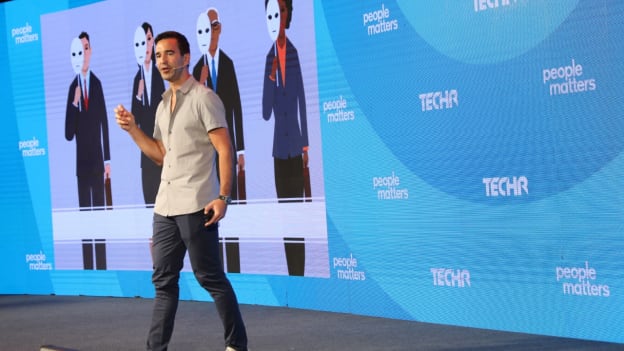Tomas Chamorro-Premuzic on rethinking leadership in the AI era

In the rapidly evolving world of business leadership, the integration of artificial intelligence (AI) is instigating a profound shift with leaders leveraging data-driven insights and advanced analytics for decision making. Leadership is forced to create environments where human creativity and AI prowess can coexist as AI transcends its traditional status to become a collaborative force.
Beyond technical expertise, the AI era mandates a deep grasp of ethics and societal values for leaders to align AI applications with higher purposes. In an engaging TechHR session, Tomas Chamorro-Premuzic, organizational psychologist and chief innovation officer of ManpowerGroup, shared his insights on reimagining leadership in the AI era. Here are some takeaways.
Embarking on an analogy, Chamorro-Premuzic drew inspiration from the world of soccer, painting a portrait of Lionel Messi's evolution from a solitary performer to a collaborative team player. This allegory mirrors the profound evolution of leadership itself—a transition from individual brilliance to the artful orchestration of collective triumphs.
He revealed a trio of critical qualities—empathy, curiosity, and self-awareness—as the very foundation of successful leadership by delving into the complex world of soft skills. In this context, artificial intelligence can play a critical role in defining a new narrative of leadership, he asserts.
According to Tomas, AI can assist in bringing diverse groups together for shared objectives while also examining the intricate interplay between self-interest and cooperation that characterises contemporary leadership.
He underscored the age-old struggle —the tug-of-war between humanity's inherent self-interest and the imperative of collaborative endeavors. And this persistent interplay of contradictions, which reverberates throughout historical eras, has a profound impact on modern leadership.
"Throughout the eons, the interplay of self-interest and collaboration has endured," Tomas said.
Discussing technology's impact, Tomas underscored the idea of how AI can help transition from monotonous tasks to more intellectually stimulating roles. He did, however, issue a word of caution, stressing the necessity of actively learning new skills to remain relevant in a changing job landscape.
In the modern world, Tomas asserted, effective leadership must be data-driven. AI should not replace human decision-making but rather enhance it, emphasising the need for a delicate balance between its analytical abilities and human intuition.
He refuted the notion that these skills are inferior to technical skills, underscoring qualities of effective leaders such as empathy and curiosity. AI is still in its infancy when it comes to replicating these human characteristics.
He also emphasized the importance of emotional intelligence (EQ) and intellectual intelligence (IQ) in leadership. While he acknowledged the value of IQ in terms of learning potential, he emphasized the crucial role that EQ plays in promoting empathic communication, collaboration, and successful teamwork.
Tomas spotlighted AI's potential to elevate feedback mechanisms, challenging with, "How can we enhance it?" Shifting to the core of leadership growth, he pondered if AI tools could unveil deeper insights, reshaping feedback's essence. This will empower leaders with multi-dimensional perspectives, foster continuous development, and lead orginsations to success.
The psychologist imagined an environment in which AI-powered platforms, such as Microsoft Teams, seamlessly integrate emotional insights during interactions, giving leaders real-time cues to navigate emotional nuance.
While AI may appear repetitive in its applications, its ability to enhance feedback, reshape leadership paradigms, and foster emotional intelligence cannot be underestimated, Tomas asserted.















